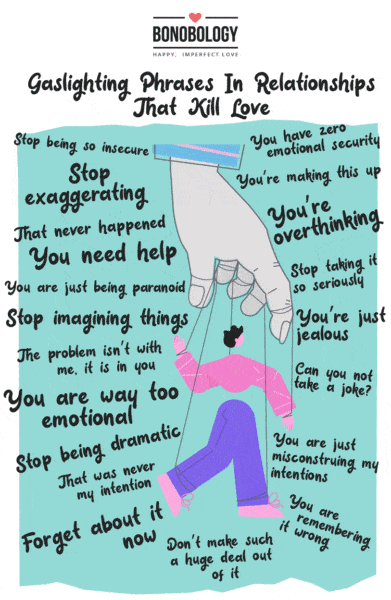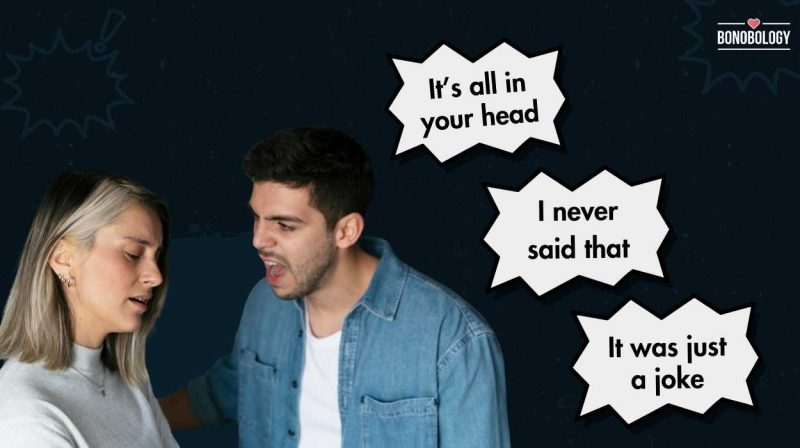“It’s all in your head.” “I never said that.” “It was just a joke.” When a romantic partner uses such seemingly innocuous phrases to deny you your reality or invalidate your emotions, it can leave you questioning your own agency. The use of such gaslighting phrases in relationships can wreak havoc on the mind of the person at the receiving end. Gaslighting is a problematic psychological exercise that is practiced with the sole intent of asserting dominance and feeling a strong sense of power over the other.
It is an absolute form of emotional abuse that can negatively impact the emotional health of the person at the receiving end. Often the preferred tool of manipulative people – narcissists, in particular – gaslighting statements are used to create confusion, control a person, and erode their sense of self-esteem.
Since emotional gaslighting can leave a person questioning their sense of reality, unable to differentiate fact from fiction, it can often become hard to sport. That’s why, we’re listing out 25 gaslighting phrases, in consultation with psychologist Juhi Pandey (M.A. Psychology), who specializes in dating, premarital, breakup, and abusive relationship counseling, so that you can recognize manipulative and emotionally abusive people – and break free.
What Is Gaslighting In Relationships
Table of Contents
Before we explore some of the commonly used gaslighting statements, it is vital to understand what gaslighting is and what it looks like in intimate relationships so that you can grasp the full extent of how damaging this tendency can be. So, what is gaslighting in relationships? The term gaslighting is inspired by the play, Gas Light, made in 1938, which was later adapted into a movie. It tells the dark story of a marriage rooted in deceit where a husband uses lies, twisted statements, and trickery to drive his wife insane to be able to steal from her.
Gaslighting is a form of psychological abuse and manipulation employed by an abusive partner with the sole objective of exercising control over their victim by making them doubt their perception of reality, and consequently, filling them with self-doubt. Juhi says, “A gaslighter’s actions may not cause harm initially. Over time, however, this continued abusive behavior can make the victim feel confused, anxious, isolated, and depressed.”
The ultimate aim here is to gain absolute control over the victim, making it easier to manipulate them and steer the relationship in the direction that suit’s the abuser’s needs. You can see how damaging it can be to have a gaslighting spouse or partner. That’s why awareness of their snide manipulative techniques is your best bet at protecting yourself.
Related Reading: 5 Signs Of Emotional Abuse You Should Watch Out For Warns Therapist
25 Gaslighting Phrases In Relationships That Kill Love
What are some gaslighting abuse examples? How do I know if someone is gaslighting me? How to respond to paranoid accusations my partner levels at me? If questions like these have been on your mind, perhaps you can sense that there is something off about the way your partner twists your words and uses them against you or relies on sarcasm, sharp jibes, or plain denial to shirk accountability for their actions.
To help you assess the veracity of your suspicion and understand whether you’re, in fact, being manipulated by your significant other, let’s take a look at 25 gaslighting phrases that are most commonly used in relationships:
1. “Stop being so insecure”
A typical gaslighter personality will never let you overcome your insecurities because these niggling doubts in your head serve their purpose. In fact, your partner may even feed into them. If you raise a concern with them, instead of evaluating their own behavior, they will target your feelings. Blaming your insecurities for whatever the issue at hand maybe allows them to get away with their own bad behavior. That’s why this is the most common gaslighting phrase used in a relationship.
Related Reading: How To Deal With A Gaslighting Spouse?
2. “You are just being paranoid”
Another favorite statement of those with a gaslighter personality. “Gaslighters often deny what they have been caught doing,” says Juhi. And what better way of doing it than by shifting blame onto you by calling you paranoid and disregarding your suspicion as though it’s a useless thought that shouldn’t be paid attention to? Along with “You are just being paranoid”, “You are reading too much into this” or “I don’t know how to respond to paranoid accusations” are the most commonly used gaslighting phrases in relationships.
3. “You are way too emotional”

This is definitely one of the most common phrases used by a gaslighter and shows their lack of empathy. The intent behind such subtle gaslighting phrases is to make you perceive your emotions as a sign of weakness or something to be ashamed of. Your reaction might be completely justified, but a gaslighter will make you feel otherwise. When you keep hearing gaslighting terms like this, it will discourage you from showing your emotions in the future.
4. “Please stop being so dramatic”
This is another one of the classic examples of gaslighting in a relationship that is predominantly directed at women. According to Juhi, women undergo gaslighting more often than men. She says, “In most male-dominated societies, women are brought up in a way that they learn to prioritize other people’s feelings over their own, making them more susceptible to gaslighting.” Here again, the intent is to invalidate your response to a situation by making it seem like an overreaction.
Related Reading: 9 Common Narcissist Gaslighting Examples We Hope You Never Hear
5. “You are just making this up”
This is a classic statement to understand gaslighting and narcissism correlation. A narcissist thrives on completely invalidating your feelings, and nothing serves their purpose better than using gaslighting phrases in relationships. For them dealing with relationship arguments is not about resolving conflict or addressing the issue at hand but proving that they’re right and you’re wrong. “I’m not arguing I’m explaining why I’m right” is a narcissist’s mantra, and making your question your reality to get away with their own bad behavior fits that narrative perfectly.
6. “Stop imagining things!”
Narcissist gaslighting phrases such as these can be extremely dangerous and can cause severe cognitive dissonance in the victim of gaslighting. By wholly invalidating your perception, this phrase can make you feel small and even borderline insane. When used repeatedly, this gaslighting phrase can make a victim lose grip on their beliefs and opinions. Given its effectiveness, it can be labeled as one of the best gaslighting phrases, at least from the gaslighter’s point of view since it serves their purpose to the T.
Related Reading: Emotional Baggage – What It Means And How To Get Rid Of It
7. “That never happened”
One of the most telling signs of gaslighting is that abuser paints the victim as someone with such an active imagination that they can spin intricate tales out of thin air. And this statement is the perfect example of how it manifests, making a victim feel like they’re crazy for believing that something happened when their partner outright denies it. These may seem like three simple words, but when used consistently, they can become a tool of extreme emotional abuse.

8. “You are just overthinking it”
This phrase is a stonewalling technique used to evade further discussion on an issue. It is easier to get away with bad behavior when you make the other person believe that making things out to be a bigger deal than they are. If you’re prone to overthinking, a statement like this can leave you feeling confused about the validity of your own emotions, making it one of the worst examples of gaslighting phrases in relationships.
9. “Stop exaggerating!”
If you’re living with a gaslighter, you will hear statement like this often. Your gaslighting spouse/partner will assuredly dismiss your concerns as trivial and exaggerated, making you feel like the bad guy for blowing an issue out of proportion. Even if your recollection of the event was not exaggerated, an implication such as this will make you doubt yourself. Of all the phrases gaslighters use for you, this may be one of the most dangerous. Chances are, your partner knows you’re not exaggerating at all and still uses such statement to leave you riddled with doubt.
Related Reading: Verbal Abuse In Relationships: Signs, Effects And How To Cope
10. “Stop taking everything so seriously”
What does it mean to gaslight someone, you ask? Well, anything aimed at invalidating your emotions can qualify as an example of gaslighting and this phrase definitely fits the bill. A narcissist or sociopath will say such hurtful things and will do everything to make the victim feel otherwise. The next time someone uses this on you, ask yourself why should you not take something seriously if it is emotionally bothering you. If it bothers you, it is serious. As simple as that.
11. “Learn to take a joke”
An example of gaslighting is when the abuser says hurtful things or makes you feel bad through their words and actions, and later passes it off as a joke. For example, they might make an unpleasant comment about your looks, the way you dress, your attitude, or even your professional accomplishments. When it upsets you, they will call it a harmless joke or playful banter. Statements meant to dismiss insensitive remarks as a form of humor qualify as classic examples of subtle gaslighting phrases.
Related Reading: 12 Hurtful Things You Or Your Partner Should Never Say To Each Other
12. “You are just misconstruing my intentions”
These are the kind of things a narcissist would say in an argument or deal with conflict of any kind. To deflect responsibility from themselves, they will skillfully label any and every problem as a result of a misunderstanding. “This is not what I meant.” “You are taking things out of context.” “That’s not how I said it.” Such examples of relationship gaslighting serve well in helping an abuser wash their hands off any accountability for their actions.
Juhi explains, “Narcissists and psychopaths have a tendency to fabricate and indulge in a lot of white lies. They use misunderstandings as a cover for their own mistakes and then pretend to sort them out smartly.”
13. “You are being unnecessarily jealous”

To feel a sense of importance and control in a relationship, a narcissist might deliberately make the victim feel jealous. They revel in strong validation by applying this method. It fosters their own self-esteem while they disregard the hurt they might be causing you. Of the different types of gaslighting in relationships, this is the most awfully manipulative. Juhi suggests that a manipulative or abusive person may resort to such statements because they thrive on their partner’s dependence on them.
14. “I’m not the problem, you are”
This has to be the most terrifying of gaslighting phrases in relationships using which a gaslighter can project their own issues onto the victim. The victim is forced to question their sanity, actions, and feelings constantly. Red flag sayings such as this one are used to shift blame and induce self-doubt. Your manipulative partner knows that as long as they keep you questioning yourself, they’ll be able to get away with whatever it is they’re doing.
Related Reading: 8 Signs of Covert Narcissist Hoovering And How You Should Respond
15. “You lack emotional stability”
One of the most hurtful examples of relationship gaslighting points to rampant emotional abuse as it attacks a person’s most vulnerable state. In romantic relationships, partners should be able to let their guard down and be vulnerable with each other. However, when things shared in a moment of vulnerability are used against you to question your emotional stability, it can be a deeply scarring experience that can leave you riddled with trust issues.
16. “That was never my intention, stop blaming me”
Not very different from, “Look what you made me do”, this statement is aimed at taking the heat off the abuser and shifting blame onto the victim. Red flag sayings such as these can make a person in an abusive relationship believe that they are somehow responsible for the way their partner has been treating them or that when they’re mistreated, they’re somehow “asking for it”. Not only can this ruin your relationship but also inflict deep emotional wounds that can make it near impossible to break-free from the cycle of toxicity and abuse.
17. “I think you need help”
Calling someone crazy is gaslighting, and so is insinuating that a person’s reactions and emotional responses may be an outcome of underlying mental health issues – when that is not the case. Most common gaslighting phrases such as these aim to establish that there’s something inherently wrong with you and make you question your sanity. Even if your mental health is robust, a statement such as this will make you feel like something is wrong with you – especially when used repeatedly to invalidate all your reactions and responses.
Related Reading: 12 Warning Signs Of Gaslighting And 5 Ways To Deal With It
18. “Just forget about it now”
Shying away from addressing problems is one of the biggest signs of an unhealthy relationship. When you’re in a relationship with a toxic partner, this becomes your reality. They use some of the best gaslighting phrases to sweep issues under the carpet and pressure you into pretending that all is well in your relationship. This can affect your thought process and leave you deeply unsettled. Remember, no one else should get to decide what you should “forget about” and what deserves your attention.
19. “You are remembering it wrong”
Yes, gaslighting personalities can cast aspersion on your memory. This is one of the more dangerous examples of gaslighting in a relationship as it can leave your sense of reality completely warped by coercing you into remembering a situation differently even though you could’ve sworn what they saw and felt was true. When subjected to such gaslighting phrases in relationships, even the most confident people can begin to doubt themselves.
20. “Come on, stop making such a big deal of things”
Juhi highlights, “Gaslighters are prone to being defensive and adept at trivializing any issue that their partners may bring up.” She also suggested that they prefer to stay in a state of denial and expect the same from their partners, as it serves their objective of shirking accountability.

21. “Everyone agrees with me”
This gaslighting statement works perfectly in invalidating the victim’s concerns, thoughts, and opinions, by making them feel isolated. Your partner may use the opinions of the people you trust and respect to further bolster the self-doubt they have instilled in you by constantly making you question your judgment and the validity of your thoughts. This, in turn, makes it harder to spot the manipulation at play.
22. “Why can’t you be more like X?”
A gaslighter may use comparisons to attack your self-worth and leave you feeling devalued in a relationship. Asking you to be more like a friend, a sibling, or a coworker is a way of saying you’re not good enough. For a victim of gaslighting, who is already dealing with a diminished sense of self, this can be a crushing blow that can make them feel like they’re not worthy and that their partner is doing them a favor by choosing to be in a relationship with them.
23. “How dare you accuse me of that!”
This statement is an example of the DARVO technique – Deny, Attack, Reverse Victim & Offender – most commonly used by narcissistic abusers. Such narcissist gaslighting phrases are aimed at turning the tables by making you push aside the issues that may have been bothering you and focus on making amends with your partner.
24. “Am I not allowed to have any negative emotions around you?”
Again, the gaslighter’s objective here is to make you out to be the bad guy and paint themselves as the victim. Such statements can leave you asking, “Is it gaslighting if my partner makes me feel like a bad person?” And the answer is, yes. If instead of being apologetic about unsettling behaviors like lashing out, throwing a temper tantrum, yelling, name-calling, or the silent treatment, your partner makes you feel bad about not giving them space to channel their negative emotions, it’s definitely a red flag.
25. “Gaslighting is not real you’re just crazy”
Having educated yourself about the inner workings of gaslighting relationships, if you draw your partner’s attention to the fact that they use their words to manipulate and control you, and they respond with something like this, consider it a warning sign that you need to walk away from this relationship in order to protect yourself.
How To Respond To Gaslighting Phrases?
Now that you can understand the gaslighting meaning in relationships and identify that that’s what you’ve been dealing with, we suspect there is another question on your mind: how to respond to gaslighting? Juhi says, “A good starting point would be to stop feeding your manipulative partner the validation they need to keep this cycle of abuse going. Here are some tips on how to deal with gaslighting in a relationship:
- Disengage from your partner when they resort to gaslighting tactics
- Lean on a trusted friend for support and seek their input to validate your version of reality
- Start maintaining a record of events – journal entries, video and audio recordings – so that you can counter gaslighting with facts
- Don’t let your partner steer a conversation in a direction where they can throw you down the rabbit hole of self-doubt
- If that happens, leave the conversation. It’s crucial to set and enforce boundaries with a gaslighter
- Respond to gaslighting phrases with statements like “Don’t tell me how I feel”, “I know what I saw”, “My feelings and experiences are real. You are being insensitive in telling me otherwise”, and “I will not continue with this conversation if you continue to invalidate my feelings”
Key Pointers
- Gaslighting means denying a person’s reality with an objective to make them question their own feelings, experiences, and emotions
- It is a dangerous manipulative technique often employed my narcissists and people with abusive tendencies
- ”That’s not what happened”, “Stop exaggerating”, “Learn to take a joke” – statements like these, aimed at nullifying your emotions and reactions are some of the classic gaslighting phrases used in relationships
- The best way to deal with it is to identify the pattern, disengage, bolster your truth, and confront a gaslighter with evidence and counter statements
Apart from being a tool of manipulation and control, gaslighting can also be an indicator that your partner may be struggling with a psychological disorder. Juhi says, “People with personality disorders, such as narcissistic personality disorder or antisocial personality disorder, most commonly use gaslighting as a way to control others.” If you find yourself at the receiving end of such gaslighting statements, know that your relationship is deeply unhealthy. It is up to you to figure out whether you want to stay on and find a way to repair this bond or walk away for the sake of your sanity and mental health.
This article has been updated in April 2023.
FAQs
Gaslighting in a relationship can entail anything from snide remarks, sarcasm, hurtful jibes, and downright lies, all aimed at creating doubts in a person’s mind about their own memory, sanity, and self-esteem.
Gaslighting tactics refer to the manipulation employed by an abusive partner with the sole objective of exercising control over their victim by making them doubt their perception of reality, and consequently, filling them with self-doubt.
You know you are being gaslighted when someone keeps blaming you, is overly critical of whatever you do, questions your every move, and casts doubts on your sanity.
Yes, gaslighting can be unintentional, or at least, a result of behavior patterns a person may not be consciously aware of. Phrases like “you can’t take a joke” or “you are being unnecessarily jealous” are often used in arguments more as a defense mechanism than as a way of denying someone their reality .
Gaslighting in relationships is characterized by the perpetrator using different phrases, terms, and statements to deny their victim’s sense of reality. From passing off sensitive remarks as a joke to claiming that their victim needs help with their mental health or making them question their own memory, a gaslighter can slowly but surely fill their victim with so much self-doubt that they can no longer trust their own judgment.
Your contribution does not constitute a charitable donation. It will allow Bonobology to continue bringing you new and up-to-date information in our pursuit of helping anyone in the world to learn how to do anything.


